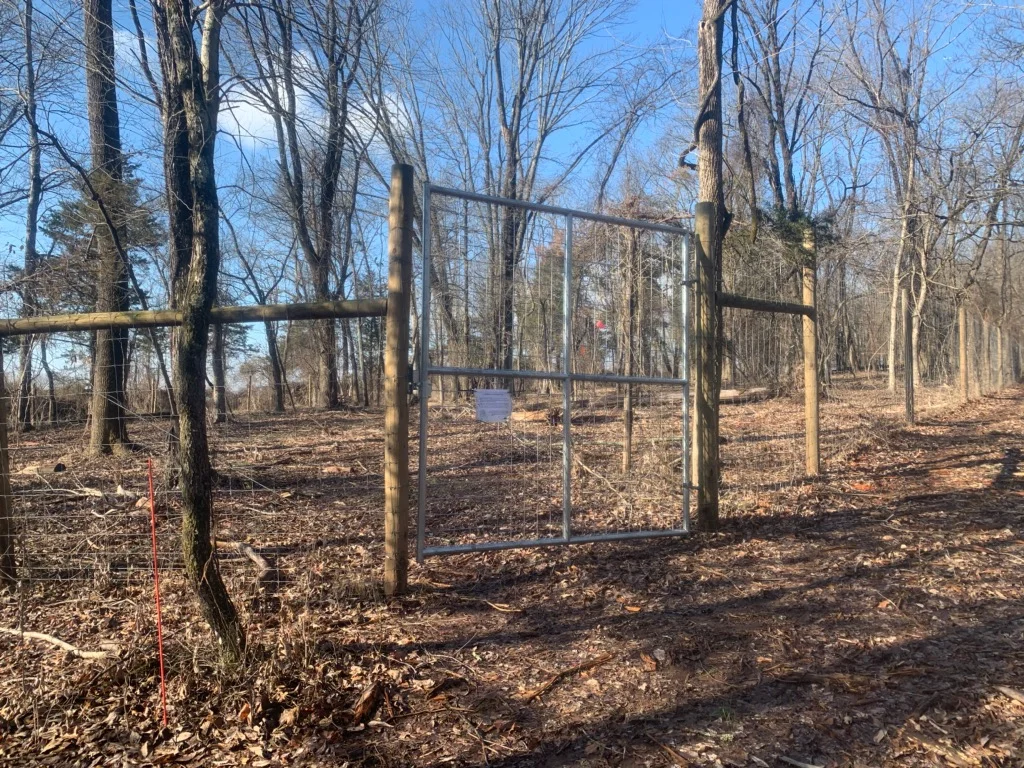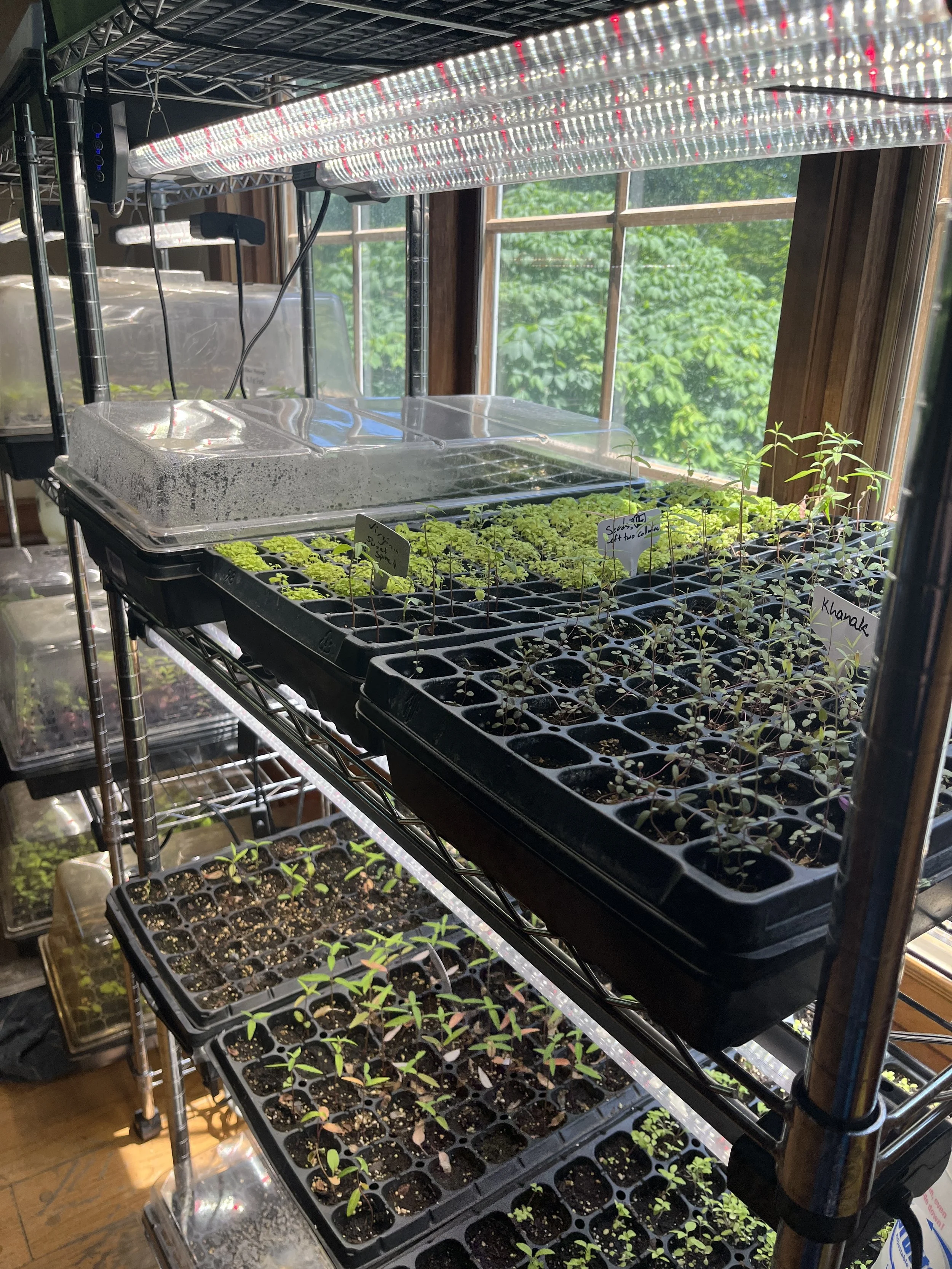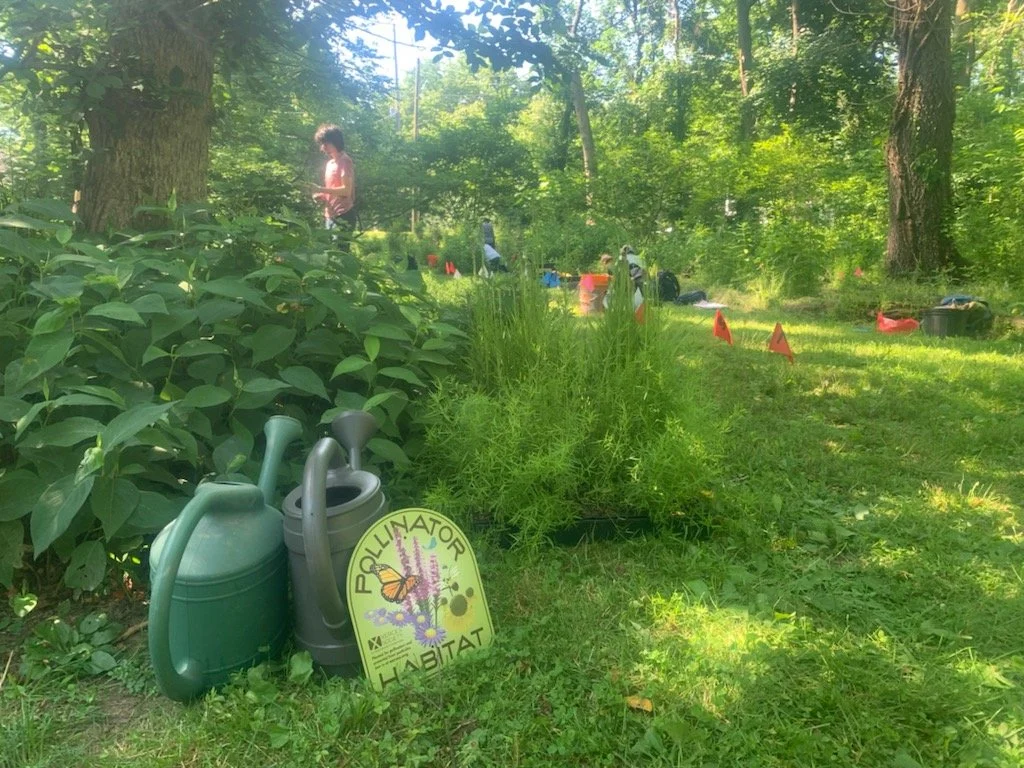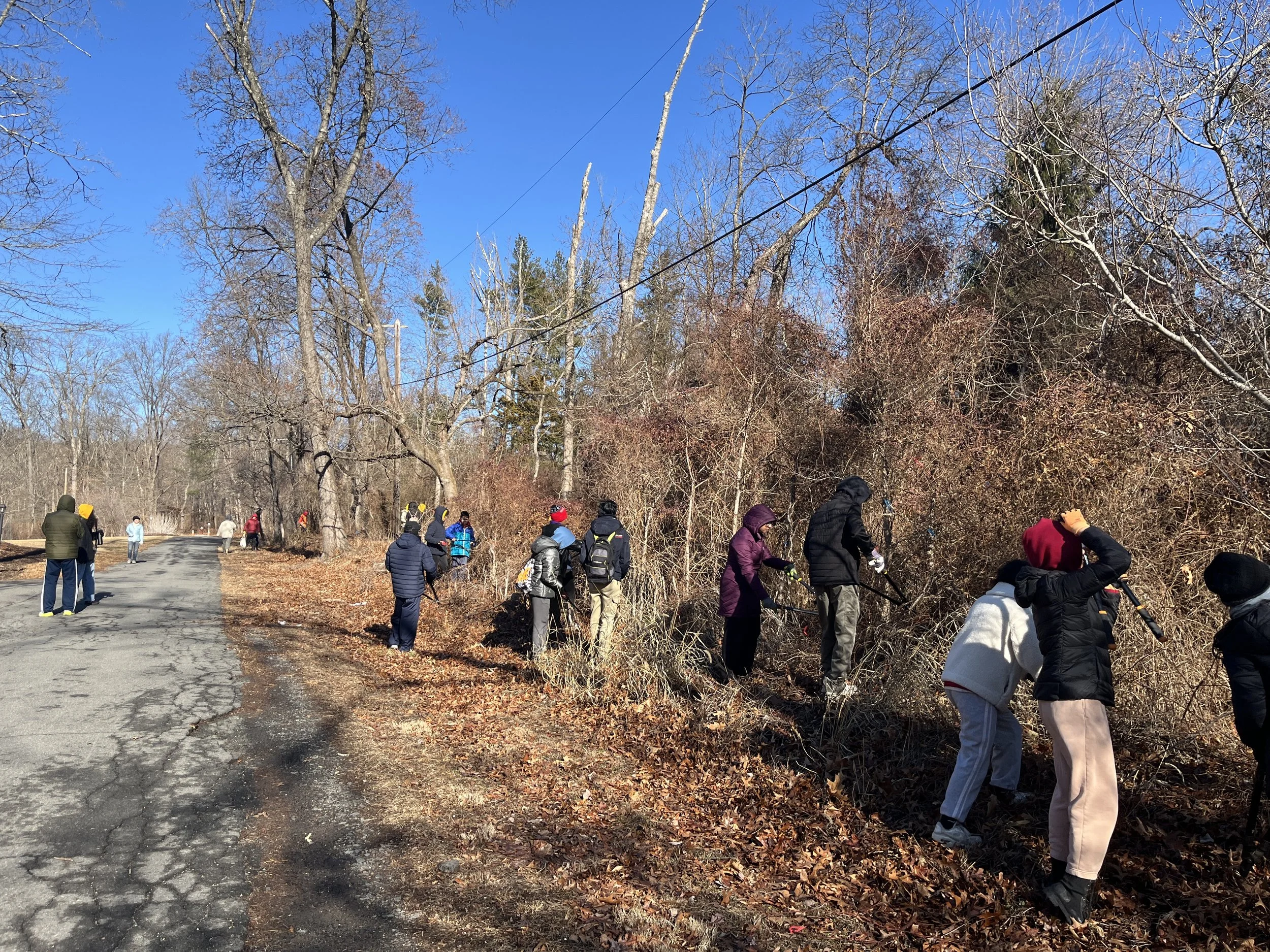Stewardship Projects at the Billy Johnson Mountain Lakes Nature Preserve
Forest Restoration Project
The 18-acre Forest Restoration Project at the Billy Johnson Mountain Lakes Nature Preserve is a major ecological initiative by Friends of Princeton Open Space to restore native forest habitat. The pressure posed by the overabundance of white-tailed deer is a driving force behind forest degradation in our area. A large deer exclosure fence was constructed within the project site to protect 8.5 acres of forest habitat; this functions as a long-term method for passive forest restoration, allowing native plant communities to thrive without the browsing pressure from deer.
This project site has also been devastated by the invasive emerald ash borer, killing off nearly all of the ash tree population and leading to significant canopy loss. Since 2019, more than 3,000 volunteer hours went into removing invasive species, planting native vegetation, and protecting young plants from deer browse. Over 8,000 native trees, shrubs, and herbaceous plants have been planted by our stewardship team and volunteers!
Led by FOPOS’s Natural Resource Director and supported by interns and community volunteers, the project has already transformed the landscape. Native wildflowers, ferns, and trees are thriving, enhancing habitat for wildlife, improving stormwater management, and offering visitors a more vibrant and educational natural experience. This project’s focus has shifted from large-scale planting to invasive management. This site is also home to a small grove of 100% native American chestnut trees planted in 2020 with support from ArcheWild. A stone American chestnut leaf sculpture, created by eco-artist Susan Hoenig, can also be observed in this project site and helps bring awareness to the American chestnut tree restoration efforts.
25-Acre Riparian Restoration Project
Our current stewardship focus is the 25-acre riparian restoration project along the shores of Mountain Lake and its feeder streams. Riparian zones, where terrestrial ecosystems meet aquatic ecosystems, are vital for protecting water quality, preventing erosion, and supporting diverse wildlife. This project includes removing invasive plants, planting native species, and engaging volunteers in hands-on restoration work.
This work is essential for building a more resilient riparian ecosystem and for maintaining the health of the watershed. The water that flows through Mountain Lakes ultimately finds its way into the Raritan River, an important drinking water source for central New Jersey. By enhancing riparian biodiversity, improving stormwater management, and offering meaningful environmental education opportunities, the project not only supports the ecological integrity of Mountain Lakes but also enriches the experience for all who visit the Preserve.
Native Plant Propagation Program
Our Native Plant Propagation Program is supported by the Garden Club of Princeton’s Partners for Plants program. Volunteers are guided by our land stewardship team to help collect, process, and sow native seeds from the Preserve, nurturing them through their growth. We follow specific techniques like cold stratification to ensure the success of each species. Once the plants are strong enough, they are transplanted into larger pots and later planted in our restoration project sites.
Involving volunteers in this process not only strengthens the program but also educates the community about the importance of native plants in healthy ecosystems. Volunteers learn how to replicate native seed propagation on their own and gain hands-on experience in ecological restoration. This collaboration fosters a deeper connection with nature, helping to grow awareness about the value of native plants and their role in preserving biodiversity. Thanks to the support of the Garden Club of Princeton and our amazing volunteers, we’re able to grow and plant native species year after year.
Pollinator Garden
Thanks to a generous gift of a Northeast Monarch and Pollinator Habitat Kit from the Xerces Society in 2022, volunteers and interns planted over 700 herbaceous plugs in the Pollinator Garden near the entrance of the Billy Johnson Mountain Lakes Nature Preserve. This garden features eleven native species, such as swamp milkweed and blue mistflower, and provides critical habitat for Monarch butterflies and other beneficial pollinators.
Ongoing stewardship efforts ensure the garden remains healthy and thriving, with volunteers actively removing invasive species like Dame’s rocket and stilt grass. These efforts help maintain a high-quality pollinator habitat, supporting biodiversity and the conservation of essential pollinator species.
Beech Leaf Disease Management Plan
In the summer of 2024, FOPOS’s stewardship interns surveyed 300 beech trees at the Preserve and found that every single one showed signs of Beech Leaf Disease (BLD). This fast-spreading and deadly disease is caused by a microscopic nematode that damages leaf tissue. Symptoms include dark banding between veins, early leaf drop, and, typically, tree death within five to seven years. Without intervention, widespread loss of beech trees will create canopy gaps, encourage invasive plant growth, and degrade wildlife habitat. Beech trees support a complex ecosystem, providing food for turkeys, grouse, and small mammals, while also hosting insects and nesting birds.
With the generous support from Washington Crossing Audubon Society through the Holden Grant, FOPOS has launched a beech leaf disease management plan. This effort is critical to protecting the Preserve’s biodiversity, especially along the sensitive Princeton Ridge corridor, housing some of the oldest trees at the Preserve. Working with the municipal arborist, several specimen trees will be treated, and monitoring and management will continue across the upcoming years. Since we anticipate losing hundreds of beech trees, restoring the next generation of forest canopy is crucial and will be the focus of stewardship volunteer sessions in the summer of 2025 to offer resiliency to affected beech trees by installing protective cages around future canopy trees and managing invasive species near establishing beech tree stands.
Driveway Beautification Project
The Driveway Beautification Project is transforming the entrance to the Billy Johnson Mountain Lakes Nature Preserve into a vibrant, native forest landscape. As visitors make their way down the long driveway into the Preserve, whether on foot, by bike, or by car, will feel a sense of place in nature, drawing them deeper into the heart of the Preserve toward the Mountain Lakes House.
Through the removal of invasive species and the careful planting of native trees, shrubs, and groundcover, this project will create an immersive experience, alive with the sights, sounds, and textures of a thriving healthy forest. The driveway leads visitors to several trailheads, offering access to over nine miles of trails that wind through a diversity of ecosystems including upland forests, wooded wetlands, meadows, rocky creeks, boulder fields, and two scenic lakes.
Community Park North Forest Restoration | Natural Climate Solutions
This 45-acre forest restoration project at Community Park North aims to improve ecosystem health and increase carbon sequestration. Originally planted in the 20th century with non-native Norway spruce and Eastern white pine, many of which have been lost to storms, the area will be restored through the removal of invasive species and the planting of thousands of climate-resilient native trees and shrubs.
The Municipality of Princeton, in partnership with Friends of Princeton Open Space, has received a $552,000 Natural Climate Solutions grant from the New Jersey Department of Environmental Protection, funded through the Regional Greenhouse Gas Initiative (RGGI). Additional funding is provided by the Municipality of Princeton.
The work will be completed in phases by a combination of contracted crews and FOPOS-coordinated volunteers, with the goal of reestablishing a thriving, climate-resilient native forest.




